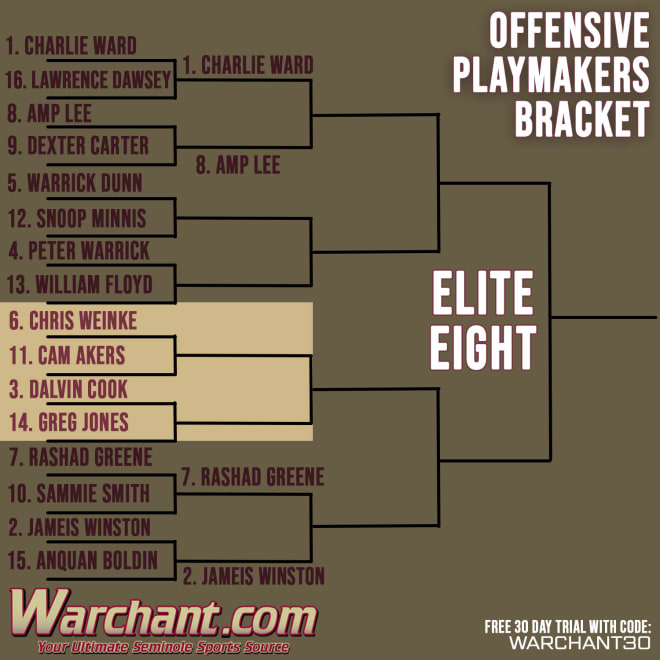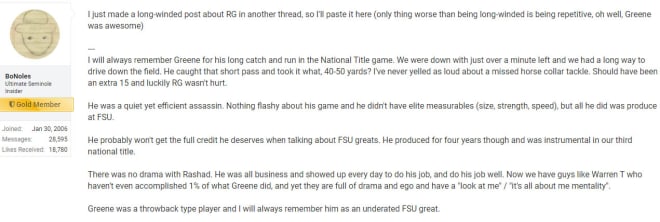Dalvin Cook vs. Greg Jones highlights Day 3 of Bracket Challenge
The higher seeds cruised again on the second day of Warchant's 2020 Bracket Challenge. Jameis Winston received 87.2 percent of the vote from Warchant subscribers on the Tribal Council and 88.3 percent on Twitter to roll past Anquan Boldin. And Rashad Greene cruised past Sammie Smith with 66.2 percent of the vote on the Tribal Council and 83 percent on Twitter.

The madness continues today with another pair of first-round matchups in the Offensive Playmakers region. The first one is a showdown of two of the top running backs in school history, and the other is a battle of a Heisman Trophy winner vs. a player who carried the Seminoles' offense for much of his career.
No. 3 seed Dalvin Cook vs. No. 14 seed Greg Jones
No. 6 seed Chris Weinke vs. No. 11 seed Cam Akers
If you need more information and insight, we present bios on each player below:
Don't miss our great FSU sports coverage. Get your 30-day FREE trial

In addition to voting on our Tribal Council message board, you can also submit your vote on Warchant's Twitter account. The voting window is 24 hours, and each round offers an opportunity for Warchant subscribers to win a $25 e-card to Garnet & Gold. That prize will go to the person who makes the most compelling and/or original argument for their vote.
If you already know who gets your vote, click here to make your picks on the Tribal Council:
The Matchups
No. 3 seed Dalvin Cook vs. No. 14 seed Greg Jones
Dalvin Cook was a five-star recruit and the nation's No. 2-rated all-purpose back when he signed with Florida State in 2014, and he certainly lived up to that billing. Cook busted onto the national stage as a true freshman, breaking the school's freshman rushing record with 1,008 yards, and he seemed to get better every year. The Miami native set a new school record with 1,691 rushing yards in 2015, and he also broke the FSU mark for all-purpose yards with 1,935. Cook finished seventh in the Heisman Trophy voting that season and racked up at least 150 yards in six different games. But it was during his junior campaign that Cook might have solidified himself as the greatest running back in school history. He finished that year with 1,765 rushing yards, 488 receiving yards and 20 total touchdowns. For all of his impressive statistics, Cook will perhaps be best remembered for his dominant performances against his hometown Miami Hurricanes, rushing for more than 450 yards against them in three games. He left early for the NFL following the 2016 season and has emerged as one of the top running backs in the game.
Greg Jones is one of the most impressive physical specimens to ever play at Florida State and has become somewhat of a folk hero because of his physical running style. Jones possessed exceptional speed for his size -- he was 6-foot-1 and nearly 250 pounds -- and was almost impossible to bring down on first contact. The most memorable play of his career is one that will be celebrated by FSU fans for years to come -- a 2003 carry against North Carolina that saw him lower his shoulder and knock the helmet off of Tar Heels defensive back Dexter Reid. The South Carolina native rushed for 2,535 yards in his four-year career and averaged 5.3 yards per carry. Jones transformed into a fullback at the next level, spending nearly all of his decade-long NFL career with the Jacksonville Jaguars.
No. 6 seed Chris Weinke vs. No. 11 seed Cam Akers
Chris Weinke is likely the most controversial seeding choice in the entire bracket. Despite being one of only three Heisman Trophy winners in FSU history and boasting a career record of 32-3 as the Seminoles' starting quarterback, Weinke was listed as the No. 6 seed in the Offensive Playmakers regional. Weinke originally signed with FSU out of Minnesota in 1990 but opted to pursue professional baseball before returning to Tallahassee as a 25-year-old in '97. After serving as a backup as a freshman, Weinke claimed the starting job as a sophomore and never looked back. His breakout season came in 1999 when he led the Seminoles to a perfect 14-0 season, a national championship and the first wire-to-wire season for a No. 1 team in modern college football history. Weinke passed for 3,103 yards and 25 touchdowns that season, then obliterated those marks one year later with 4,167 yards and 33 touchdowns en route to winning the Heisman Trophy in 2000. He still holds FSU's all-time records for passing yards in a game, season and career.
Cam Akers will be best remembered for being an outstanding player during a rough three-year stretch for FSU football, leaving fans wondering what he might have accomplished on better teams. Akers came to Tallahassee with enormous hype as the No. 2 running back in the country and No. 3 player overall, and it took him little time to emerge as a star on the college level. Despite not starting for much of the season, he broke Dalvin Cook's freshman rushing record in 2017 with 1,024 yards; he also ran for seven touchdowns. An ankle injury, a woeful offensive line and a poor overall offense limited Akers' production in 2018, as he finished with a disappointing 706 rushing yards and six touchdowns. But the Mississippi native rebounded strong as a junior in '19, racking up 1,144 yards on the ground and 14 touchdowns, despite again playing behind a struggling offensive line. Akers was a workhorse throughout his career, ranking fifth all-time in FSU history with 586 rushing attempts in just three seasons. He joins Cook and Warrick Dunn as the only backs in FSU history with more than one 1,000-yard season, and he did it on teams that posted a combined record of 18-20 during his career.
Winner of $25 eCard from Garnet & Gold - BoNoles

Click here to make your votes on the Tribal Council. If you're not yet a member of Warchant.com, start your 30-day Free Trial today. (Votes also can be placed through the poll at our official account on Twitter, @Warchant.)
About the tournament
We've broken down the field of 64 into four 16-team brackets:
* Offensive Playmakers
* Defensive Playmakers
* Linemen (offensive and defensive)
* Legends/Special Teams
The first three "regions" are pretty self-explanatory. The final one is a combination of eight Seminole "legends," which we've defined as players who graduated by 1985 (just before the Dynasty era really began), and eight special-teams players.
The special-teams players were broken down further into two four-team brackets -- kickers/punters and "specialists" (return men or players who specialized in blocking kicks).
* CLICK HERE for a printable bracket
(Note: Players who already held a spot in one of the other categories were not eligible to also be selected as specialists. That is why Deion Sanders, Peter Warrick and Terrell Buckley are not listed there.)
----------------------------------------------------
Talk about this story with other Florida State football fans in the Tribal Council
